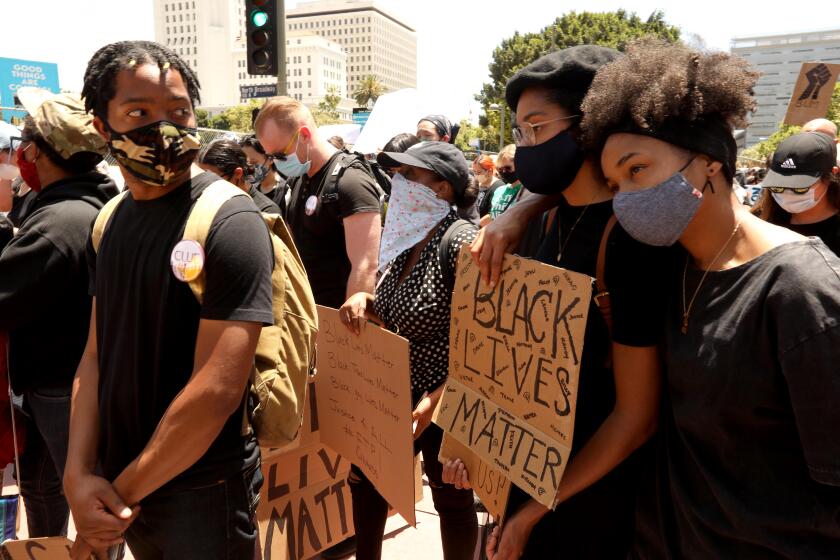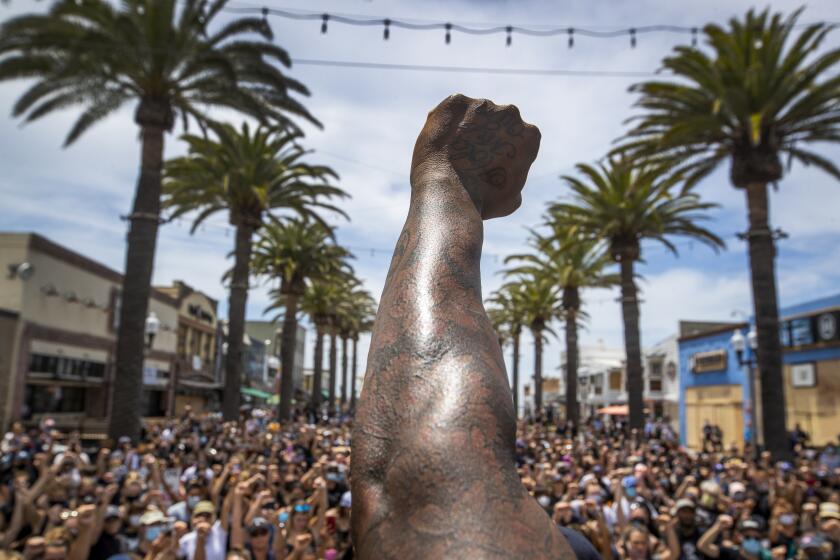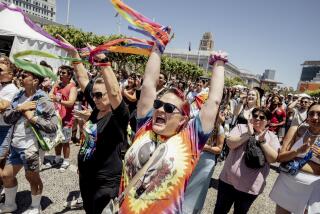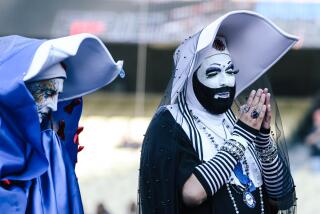Pride began as a protest. In 2020 in L.A., it will be again
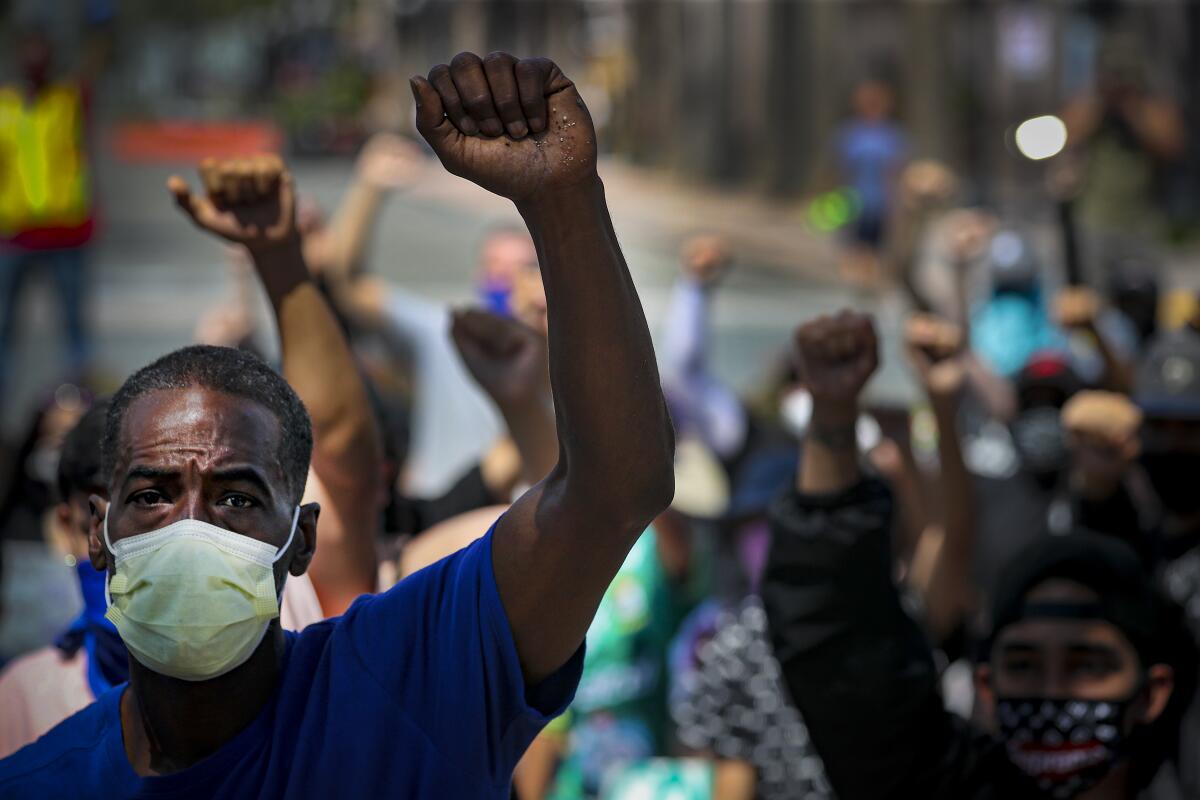
It started with the global pandemic that made in-person gatherings a health risk. Now, with protests against police violence and racial oppression sweeping the world, LGBTQ leaders are urging their communities to express solidarity and support, whether in person or online.
“We don’t make space for the reality that black queer people exist,” said David Johns, executive director of the National Black Justice Coalition, an organization that serves the needs of the African American LGBTQ community in the United States. “Everybody should be really clear about [Pride’s] origins in resistance and rebellion. Pride has more to do with what people are calling protests than [it does] with the parades that ignore all of these realities.”
There will be a Black Lives Matter march in L.A. on June 14. But Christopher Street West, the organization that produces L.A. Pride, will not be involved.
In recent years, most Pride celebrations have been joyous, with parades, dance music, parties, crowded bars and corporate-sponsored rainbow swag. It’s a stark change from the attitudes at the first Pride marches, said Michael Bronski, author of “A Queer History of the United States” and professor of the practice in media and activism in studies of women, gender and sexuality at Harvard University.
“The first march in 1970, they were anchored in anger,” Bronski said. “This was really a political march. There were no corporate sponsors. Nobody had signs on buses and trains with rainbow flags for Levi or Subaru. … The first gay pride march and Stonewall was a recognition that gay men and lesbians were in fact oppressed by a larger society.”
Those Pride marches — which first took place 50 years ago this month — were a commemoration of Stonewall a year earlier, where the community staged three days of insurrection against police violence and unjust laws. At the time, gay bars were routinely raided by police.
A lot of people know about what happened at Stonewall, Bronski said, but they don’t realize that it probably wouldn’t have happened the way it did without the massive unrest and upheaval that took place around the country in the 1960s.
This year’s L.A. Pride will be a peaceful protest march in solidarity with the Black Lives Matter movement, organizers announced. It will take place June 14 starting at Hollywood and Highland.
Stonewall “was born of a moment of enormous cultural and social and political upheaval in America. I would argue that Stonewall would never have happened if it wasn’t for the Black Power movement, the radical feminist movement, ... antiwar protests, the counterculture. All of those movements were in your face. And what marked Stonewall so clearly was that it was in your face.”
Earlier this week, a new sign went up on the Stonewall building: “Pride is a riot.” Bronski said “riot” is perhaps an imprecise term to describe Stonewall now — he prefers “insurrection” — but that it is good to remember Pride’s origins in resistance toward oppression.
“Saying ‘Stonewall was a riot’ really brings it back to police abuses, abuses of the law, really brings it back to its political roots,” Bronski said.
Which brings us to Pride this year. L.A. Pride was one of the first events to announce a postponement and then cancellation due to the coronavirus pandemic. The Christopher Street West Assn., the organization that produces the L.A. Pride festival and parade, planned a slate of online events and a TV special.
Then, Pride pivoted. On Wednesday, Christopher Street West announced that this year’s event was back on, in the form of a solidarity protest march. The decision was a unanimous one, said Estevan Montemayor, the organization’s president.
“I think it is our imperative to continue to fight the injustice and the oppression that we are currently witnessing. It’s our moral imperative,” Montemayor said. “Our organization’s mission is to create safe and inclusive spaces for the LGBTQ+ community and our allies. If we did not do this, we would not be in compliance with our own mission.”
The march is planned for Sunday, June 14. It will begin at 10 a.m. at the intersection of Hollywood and Highland boulevards and proceed to West Hollywood, ending at Santa Monica and San Vicente boulevards. Participants are urged to wear masks and follow other coronavirus health and safety precautions.
“In 1970, we gathered on Hollywood Boulevard to protest police brutality and oppression to our community,” Montemayor said. “We will do that again this year, where it began, in solidarity with Black Lives Matter.”
There are other ways to celebrate Pride this year. The Human Rights Campaign has compiled a list of virtual events and resources from around the country.
“Rather than try to plan a Pride event of our own, given that the virtual space is pretty crowded, we wanted to lift up local Prides and make sure local communities are equipped to celebrate Pride remotely,” said Elizabeth Bibi, the organization’s senior advisor for communications. Options include volunteer opportunities, ways to find local events, ideas for celebrating at home, and fun things like how to make Pride pizzas and celebrate in “Animal Crossing.”
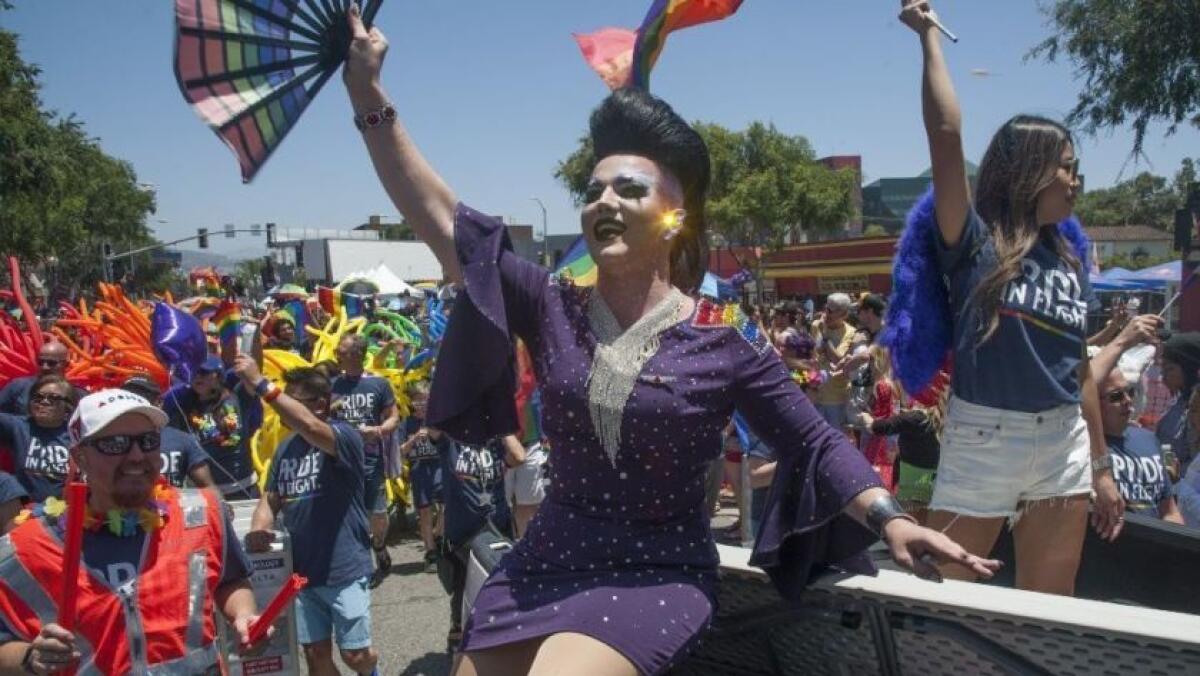
The Human Rights Campaign issued a video statement on June 1 from President Alphonso David acknowledging both the beginning of Pride month and the ongoing protests. The campaign also issued a statement, along with more than 100 other LGBTQ organizations, condemning racial violence and expressing solidarity with the Black Lives Matter movement.
“Pride started as a protest,” Bibi said. “The LGBTQ community needs to understand that change comes about through protest, and we acknowledge that. We’re embracing antiracism as core to our principles.”
The pride parade in West Hollywood has served as a spectacle, talent show, celebration, political movement and memorial.
David Johns, the National Black Justice Coalition president, had some advice for nonblack members of the LGBTQ community who are looking for something they can do right now. For starters, he said: “Sit in the discomfort.
“There are very few things that require white people to do things, let alone to sit in the discomfort of reckoning the privilege and racism and anti-blackness,” he said. “Just sit in it.”
Put some skin in the game too, he said: Donate to LGBTQ organizations led by black people, indigenous people, trans people. Sign petitions and legislation that seek to reduce police violence. Use your platform, whatever that may be, to lift up people and organizations doing work in black queer spaces. Reconsider the framing of Pride as a party and acknowledge its history.
“We’ve gone on a street and had a very public parade and erased all the reasons why we got here,” Johns said. “We take pictures with the police and celebrate with the police while forgetting they’re the reason we’re here.”
More to Read
Sign up for The Wild
We’ll help you find the best places to hike, bike and run, as well as the perfect silent spots for meditation and yoga.
You may occasionally receive promotional content from the Los Angeles Times.
